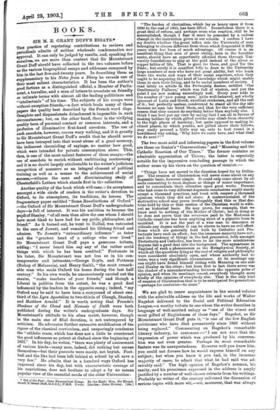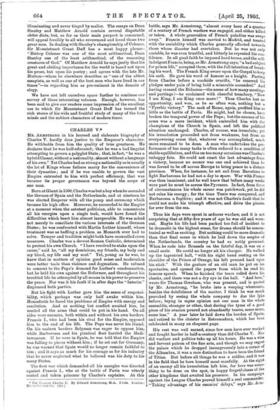BOOKS.
SIR M. E. GRANT DUFF'S ESSAYS.*
THE practice of reprinting contributions to reviews and periodicals admits of neither wholesale condemnation nor approval. It can only be judged by results, and, speaking for
lvee, we are more than content that Sir Mountstuart Grant Duff should have collected in the two volumes before us the various biographical essays and addresses composed by him in the last five-and-twenty years. In describing them as supplementary to his Notes from a Diary he reveals one of their most salient characteristics. It has been the author's good fortune as a distinguished official, a Member of Parlia- ment, a traveller, and a man of letters to associate on friendly or intimate terms with almost all the leading politicians and "intellectuals" of his time. The subjects of his essays were without exception friends,—a fact which lends many of these papers the quality best described by the French word eloge. Complete and dispassionate detachment is impossible in such circumstances; but, on the other hand, there is the vivifying quality born of personal contact or common interests, and a profusion of illuminative first-hand anecdote. The use of such anecdote, however, craves wary walking, and it is greatly to Sir Mountstuart Grant Duff's credit that he should never have been betrayed into that worst abuse of a good memory, the indiscreet chronicling of sayings, no matter how good, which were intended for private consumption alone. This, then, is one of the most salient features of these essays,—the use of anecdote to enrich without embittering controversy ; and it is no doubt largely attributable to the writer's judicious recognition of manners as an integral element of political training as well as a means to the achievement of social success,—witness the sane and discriminating study of Chesterfield's Letters which stands first in the collection.
Another quality of the book which will ensur3 its acceptance amongst a wide circle of readers is the writer's devotion to Oxford, to its atmosphere, its traditions, its heroes. The fragmentary paper entitled "Some Recollections of Oxford" —the Oxford of Sir Mountstuart Grant Duff's undergraduate days—is full of interest. It was his ambition to become the pupil of Stanley. " of all men then alive the one, whom I should have most liked to have had for my guide, philosopher, and friend." As it turned out, he went to Balliol, was entrusted to the care of Jowett, and remained his lifelong friend and admirer. To Jowett's "extraordinary influence" as tutor and the "greatest head of a college who ever lived" Sir Mountstuart Grant Duff pays a generous tribute, adding : "I never heard him say any of the rather acrid things with which he has been credited." Fortunate in his tutor, Sir Mountstuart was not less so in his con- temporaries and intimates,—George Boyle, and Patteson (Bishop of Melanesia), and Henry Smith, " the most remark- able man who made Oxford his home during the last half century." In hie own words, he unconsciously carried out the maxim, " make teachers of your friends," and though a Liberal in politics from the outset, he was a good deal influenced by the leaders in the opposite camp ; indeed, " my Orford may be said to have been a compound of about one- third of the Lyra Apostoliea to two-thirds of Clough, Stanley, and Matthew Arnold." It is worth noting that Fronde's Shadows of the Cloud and Nemesis of Faith were both published during the writer's undergraduate days. Sir Monntstuart's attitude to his alma mater, however, though in the main one of filial devotion, is not untempered by criticism. He advocates further extensive modification of the rigour of the classical curriculum, and unsparingly condemns the "athletic craze, which has done not a little to counteract the good influences so potent at Oxford since the beginning of 1851." In his day, he writes, "there was plenty of amusement of various kinds—many men, indeed, did nothing but amuse themselves—but their pursuits were manly, not boyish. Foot- ball and the like had been left behind at school by all save a very few." He admits that in a hundred ways Oxford has improved since his day, but with characteristic courage of his convictions, does not hesitate to adopt a by no means popular view of the essential needs of the older Universities :
• Out of the Past some Biographical Essays. ByLacenEi. rot Hon. Siry.Miciusneyi. Stuart E. Grant Duff, G.C.S.I„ F.R.S. 2 vols. Lo "The burden of clericalism, which lay so heavy upon it from 1830 to the end of 1850, has been lifted. Nevertheless there is a great deal of reform, and perhaps some wise reaction, still to be accomplished, though I fear it must be preceded by a radical change in the instruction given in our schools. I confess I have my doubts whether the great influx into the University of men belonging to classes different from those which frequented it fifty years since has been of much advantage. Of course it is an excellent thing that men of great ability, born in the humbler ranks, should have an opportunity afforded them through Uni- versity foundations to play at the gold instead of the silver or copper tables of life. That is good for them, and good 'for the State ; but surely it is manifest folly to draw to the University large numbers of men who have not great ability, but who learn there the works and ways of their social superiors, when they ought to be acquiring the kind of knowledge which might enable them to earn their living, and to be useful members of society. I read lately an article in the Fortnightly Review, entitled 'Our Gentlemanly Failures,' which was full of wisdom, and put the point I am now making exceedingly well. Every year adds to the number of nice young men,' quite well-behaved, not wholly ignorant of Latin and Greek, excellent cricketers, and all the rest of it ; but perfectly useless, condemned to stand all the day idle because no man has hired them, and that for the very sufficient reason that they cannot do anything better than anybody else. I think I can best put my view by saying that I am all in favour of making ladders by which gifted youths may climb from obscurity to the high places of learning; but quite opposed to making in- clined planes, by which youths, not gifted above their fellows, may easily proceed a little way up, only to look round in a bewildered way asking, Why have we come here, and what shall we do next P' " The two most solid and informing papers in the first volume are those on Senior's " Conversations " and " Manning and the Catholic Reaction of Our Times." The former contains an admirable appreciation of Thiers ; the latter is especially notable for the impressive concluding passage in which the author sums up his views on the question of reunion :— "Things have not moved in the direction hoped for by Dellin- ger. The reunion of Christendom will never come about on any dogmatic basis, however simple. It could only come about by all sects consenting to treat dogmas as things of minor importance, and to concentrate their attention upon good works. Persons who had come to very different dogmatic conclusions might surely accept a thousand practices, and treat with respect a thousand opinions which they did not share. A controversialist of the destructive school may prove irrefragably that this or that doc- trine held by this or that section of the Christian world is with- out an historical basis. He may prove, for example, that we know next to nothing of the Mother of Christ; but in doing so he does not prove that the reverence paid to the Madonna in Catholic countries has been anything short of a gigantic boon to mankind. It is not the part of a wise man to denounce or ridicule any dogma unless it can be shown to have an evil effect. Some which are generally held both by Catholics and Pro- testants have such an effect ; but the immense majority have not ; and Lhe tendency of things in the last generation, both amongst Protestants and Catholics, has been to let the more mischievous dogmas fall a good deal into the background. The appearance in England of such a phenomenon as the Metaphysical Society, at which all the questions lying at the root of religion and philosophy were considered absolutely open, and where authority had no voice, was a very significant circumstance. At its meetings any one might have found himself sitting with Manning on one side and Huxley on the other ; but from first to last there never was the shadow of a misunderstanding between the opposite poles of opinion, and when its meetings ceased, everybody thought more kindly of the opinions of everybody else. That is the only kind of reunion of Christendom that is to be anticipated for generations —perhaps for centuries—to come."
We are glad to renew acquaintance in the second volume with the admirable address on the life and works of Walter Bagehot delivered to the Social and Political Education League,—a worthy tribute to one whom the writer describes in language of well-merited eulogy as " one of the wisest and most gifted of Englishmen of these days." Bagehot, as Sir Monntstuart Grant Duff puts it, " is one of the few English politicians who have died prematurely since 1868 without being replaced." Commenting on Bagehot's remarkable literary industry, he continues :—" I am not sure that the impression of power which was produced by his conversa- tion was not even greater. Perhaps its most remarkable feature was its unexpectedness. However well you knew him, you could not foresee how he would express himself on any subject ; but when you knew it you had, in the immense majority of cases, to admit that what he had said was ad- mirably said." The high opinion of Bagehot's acumen, his sanity, and his prescience expressed in the address is amply justified by a number of well-chosen extracts from his writings. Probably no writer of the century enlivened the discussion of serious topics with more wit,—wit, moreover, that was always illuminating and never tinged by malice. The essays on Dean Stanley and Matthew Arnold contain several disputable obiter dicta, but, so far as their main purport is concerned, will appeal forcibly to all who reverenced and loved those two great men. In dealing with Stanley's championship of Colenso, Sir Mountatuart Grant Duff has a most happy phrase : " Bishop Colenso was one of the most arithmetical, Dean Stanley one of the least arithmetical, of the reasoning creatures of God." Of Matthew Arnold he says justly that his great and abiding importance for the world is based not upon his prose, but upon his poetry ; and agrees with the late Mr. Hutton—whom he elsewhere describes as " one of the ablest essayists, as well as one of the best men who have lived in our times"—in regarding him as pre-eminent in the domain of elegy.
We have not left ourselves space further to continue our survey of these interesting volumes. Enough, however, has been said to give our readers some impression of the excellent use to which Sir Mountstuart Grant Duff has turned the rich stores of his wide and fruitful study of many of the best minds and the noblest characters of modern times.



























































 Previous page
Previous page